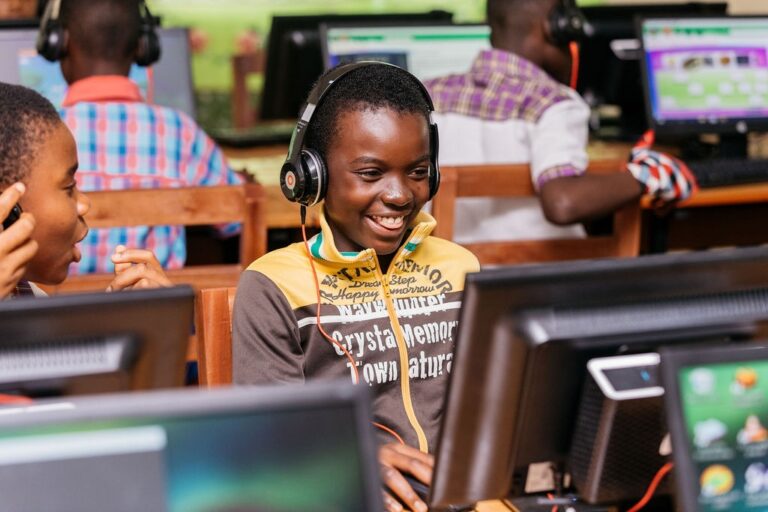Children are overseen by an adult as they play at a centre run by the Mumbai Mobile Creche organisation. Photograph: Andrew Aitchison/Alamy Stock Photo
By: Priti Salian | Fri 13 Apr 2018 | The Guardian
Construction sites in India that provide daycare are allowing cash-strapped families to build their children a future
Reshma Rathod wakes at dawn and rustles up a quick breakfast of rice with peanuts, before dressing her six-year-old daughter, Dimple, for her day at the creche.
Situated nearby, at the construction site in south Mumbai where she works, the daycare centre takes care of her only child from 8.30am to 4pm, allowing Rathod the freedom to work.
After toiling at the site for over eight hours, sweeping away thick layers of dust and scrubbing cement off the floors, Rathod earns just enough to feed her family of three through the month. But she is grateful for her job, which allows her husband to save his earnings for building a home in their village.
The creche is her lifeline. “Without this facility, I would have been unable to work,” says Rathod.
Run by Mumbai Mobile Creches (MMC), the daycare centre, which includes a preschool, supports the children of migrant workers who leave home to find work in rapidly expanding Indian cities. Among the centre’s staff are women from the construction workers’ community, each one trained in early childhood care and education. The creche helps the emotional, intellectual and physical development of the younger children, freeing their older siblings of the burden of looking after them.
According to a trade union estimate, 40 million workers migrate to other states with their families to work in the construction industry alone. The sector is one of the largest employers in India, accounting for 10% of the country’s gross domestic product.
Driven by poverty, debt or limited ownership of agricultural land, families often move as a unit because of the need for both partners to work.
After the birth of her daughter, Rathod moved to Mumbai to join her husband, Bhagat Singh, who had worked as a cook in a local restaurant for more than a decade. Attracted by the benefits that accompany employment as a construction worker, Singh quit his job to take up a role that came with a makeshift home, electricity and access to clean water. The site was also open to recruiting his wife and providing access to the creche that allows Dimple to play and learn throughout the day.
Over the course of 45 years in Mumbai, MMC’s creches have reached 270 construction sites and given more than 100,000 children the chance to have “a nurturing and happy childhood,” says Vrishali Pispati, the organisation’s chief executive.
Sister sites in Pune and Delhi provide a similar service, and the need for such facilities is clear. When both parents work at construction sites, children left behind at home are extremely vulnerable. Some saunter off and can get lost, while those who stay at home alone can fall prey to sexual abuse. The few mothers who take their children with them to sites do so at considerable risk.
In 1996, the government introduced the Building and Other Construction Workers’ Act, which stipulated that every builder with 50 female workers should provide a creche with adequate accommodation for children under six. The law is often poorly implemented, however.
“There are no regular checks in place, so other than the eminent ones, builders are not serious about providing creches,” says Vaijayanta Anand, an associate professor at Nirmala Niketan college in Mumbai and the director of Nirmana, an organisation devoted to migrant workers’ rights.
“Builders flout the law by not revealing the exact number of women workers,” says Sonia Sharma, senior programme manager for Mobile Creches in Delhi, adding that some employers merely pay lip service to the rules. “Some of them dedicate an untrained caretaker and a room for older children, but do nothing for the toddlers,” she says.
Neither are trade unions, whose focus is the regularisation of wages, of much assistance. “Most of the members of trade unions are workers who migrated several years ago and have settled into the city’s slums, so they don’t need to think much about creches and kids’ welfare,” says Anand.
Yet Urvi Aradhya, head of human resources for K Raheja Corp, an Indian developer that has MMC centres on their construction sites in Mumbai, says the firm has noticed a vast difference in work outcomes when creches are provided. “We found that the anxiety workers face about the safety and care of their young children reduced drastically,” says Aradhya. “This in turn helps them stay committed to work and be more productive.
By 9.30am, having enjoyed an hour of free play with their friends and a glass of milk, children at the centres are settled in. They play with building blocks and squeeze toys, and learn to identify objects from pictures pasted on the walls. Preschoolers learn the alphabet, sing jingles and read picture books. Fruit, snacks and lunch are provided at designated times.
Anita Karude, who has been using MMC’s daycare centre for more than a year, particularly appreciates the additional nutrition her children receive. “I can’t afford to feed my children fruits every day,” she says, adding with satisfaction that they have gained weight since attending the creche, where they have also benefited from regular medical attention.
The women have also benefited. Rathod has participated in monthly discussions held at the centre, gaining awareness about her own reproductive health as well as her child’s wellbeing, hygiene and developmental issues. Most important for her, though, is her daughter’s safety. She has worked with same builder for six years, at different sites, for the sake of the creche. “I’m glad I could find a safe space for her in my proximity,” she says.



![[Preliminary Report] CRNA Collaborative Research for Exploring Factors Nurturing"Happy and Resilient" Children among Asian Countries](https://equity-ed.net/wp-content/uploads/2024/09/1725672182698.jpg)


